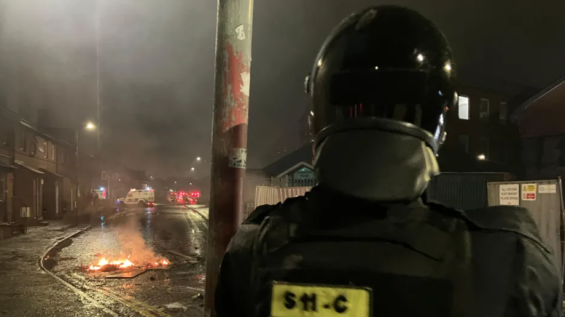After hotels housing asylum seekers, mosques are now being directly targeted. In the UK, several towns have been rocked by xenophobic violence. It all began in Southport with false rumors alleging that the perpetrator of a knife attack was «a radicalized Muslim immigrant». Despite police clarifying that the perpetrator was 17-year-old British-born Axel Rudakubana, far-right demonstrators have continued rioting since last week.
In the town where the tragedy has now claimed three lives, the mosque was targeted by projectiles as early as July 30. Dozens of police officers charged with protecting the place of worship were injured. In the following days, mosques in Hartlepool and Sunderland were also attacked. Stores and cafés known to be owned by Muslims were also ransacked. Some members of the community have shared their accounts with the British media.
Muslim entrepreneurs question the point of ransacking shops
Among them, Mohammed Idris, owner of the Bash Café in Belfast, told BBC News NI of his fears for his physical safety. Last week, his sign was ransacked by demonstrators who mentioned his name while asking about him. During the night, they eventually set fire to the premises. This entrepreneur, who has lived in the town since 2002, has already seen his computer store targeted last year. «This café was a hope, a place for a community - there is no hope here now», he lamented.
Also in Belfast, the Sham supermarket suffered the same fate. Bashir, its manager, told the same source that the flames had reduced everything to «ashes», to the point where «not a single thing [could be saved], nothing». Knowing that the store had been attacked before, the entrepreneur deplores what he describes as an «ineffective response» to prevent a recurrence. He also questions the rioters' purpose in targeting stores simply because they are run by Muslims.
Within the community, volunteers and mosque leaders have also claimed to have confronted the rioters. However, in Liverpool, chaplain Adam Kelwick says he has taken a different approach to the violence.
Muslim volunteers and mosques call for «no self-righteousness»
Adam Kelwick, an aid worker for Action For Humanity, shared his experience in an op-ed for Metro UK. A volunteer at Liverpool's Abdullah Quilliam Mosque, the 41-year-old imam said he approached protesters who had gathered for a rally last Friday outside the place of worship. «We wanted to keep our doors open to invite the protestors in to engage with us and listen to them, however the police advised it was not safe to do so», he said. Supported by hundreds of people of all faiths, he wrote, «we waited for three hours until the initially febrile tensions simmered down to a point where we felt it was safe to engage».
«We approached the protestors offering food. Some ignored us at first, some politely said no, but eventually some accepted. From there we began to exchange smiles, had discussions and those who had initially rejected us saw the warm atmosphere that was being created and realised that there was an opportunity for something more constructive than anger and hate», the imam further asserted.
«My sincere wish is that if we listen to each other and learn from each other, we can overcome our differences», Adam Kelwick
Dr. Abdul Hamid, a family doctor and the mosque's president, believes there is a «fear of the unknown». «If they don’t get answers, they will try to find any excuse to label you», he notes. In his op-ed, Adam Kelwick also mentioned being approached by one of the protesters, who admitted he knew the Southport respondent wasn't Muslim but was «just fed up» with the police.
«Scratching below the surface of what was going on», he said that he «found people not to have been motivated by anything in particular - rather just lashing out in a state of general frustration».
Quoted by The Guardian on Tuesday, Qari Asim, chairman of the National Advisory Council of Mosques and Imams in the UK (Minab), called for calm and restraint from his community. He emphasized that it's not up to Muslims to take the law into their own hands. «The attacks have naturally angered and frightened many in the Muslim community. Many young Muslims people want to defend themselves and their institutions», he added.
However, Qari Asim insisted that taking justice into their own hands would be giving a gift to the extremists. «It’s the job of the police and other authorities to protect individuals and mosques, and we should support them rather than become a hindrance», he warned.
UK government pledges firmness against «keyboard warriors»
Speaking after an emergency meeting on Wednesday evening, UK Prime Minister Keir Starmer said that those involved in unrest in parts of England and Northern Ireland «can expect to be dealt with by the courts within a week». The official insisted that the targeted communities would be «safe», claiming that his government was doing «everything we can to ensure that where a police response is needed it's in place, where support is needed for particular places, that that is in place».
Home Secretary Yvette Cooper warned that «keyboard warriors cannot hide». Their actions would be «liable for prosecution and strong penalties too», she promised. Earlier, the Director of Public Prosecutions in England and Wales assured that he was «prepared» to consider charging some of the rioters with terrorism-related offences. In this regard, he said he was aware of «at least one case» where the facts could potentially be classified as such by the courts.
Citing police sources, the BBC reported on Wednesday that almost 6,000 public order officers were being mobilized over the next few days, particularly in London. Additionally, one individual has been taken into custody following the violence in Bolton on Sunday.





 chargement...
chargement...













